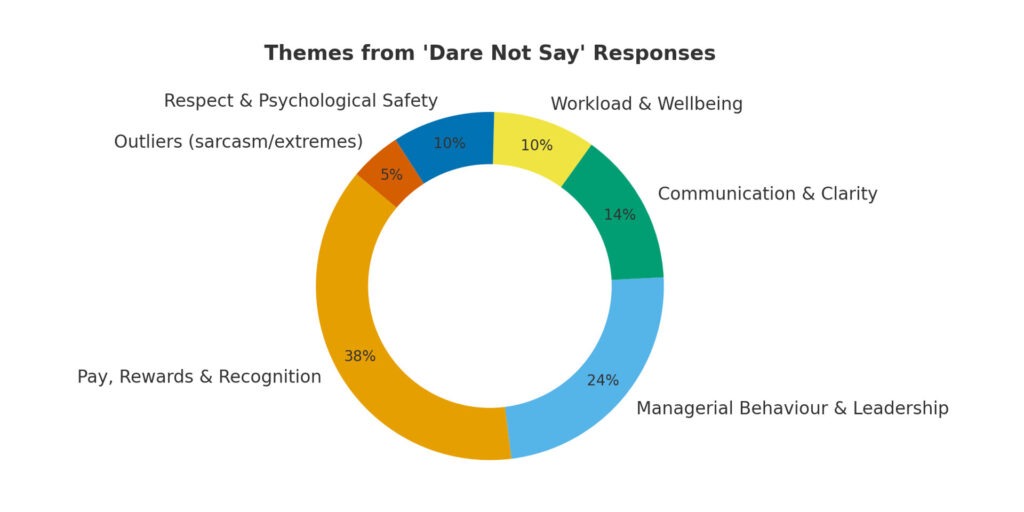During our recent exhibition at the NHCCE in Kuala Lumpur, Simia Business Development conducted a live poll with 100 conference attendees who visited our booth.
We asked a simple but revealing question:
“What would you dare not say to your manager or director?”
The responses uncovered unspoken frustrations, hidden truths, and cultural dynamics surrounding trust, fairness, and psychological safety in the workplace. Comments ranged from practical concerns like pay and workload to deeply personal emotions, offering a raw look at organisational sentiment.

Key Themes
1. Pay, Rewards, and Recognition (≈40% of responses)
- “Increase my salary.”
- “Ask for an increment.”
- “Advance payment.”
- “My job is not worth the salary.”
- “Please increase our bonus this year.”
A significant portion of participants expressed dissatisfaction with pay, bonuses, and benefits. Many highlighted unfairness and lack of transparency in how rewards are handled.
2. Managerial Behaviour and Leadership Style (≈25%)
- “Stop micromanaging.”
- “You are wrong.”
- “You don’t know everything.”
- “You are a bad boss.”
- “Please improve your management skills.”
Comments revealed frustration with leadership styles and communication gaps. Some voiced personal resentment or emotional fatigue, while others highlighted bias and lack of trust.
3. Communication and Clarity (≈15%)
- “Provide clear tasks.”
- “Be clear in what you want, please.”
- “Let’s align our communication.”
Participants noted mixed signals, unclear instructions, and avoidance of open conversations. One remarked, “Sometimes your urgent feels like my panic attack,” reflecting how unclear priorities can create stress.
4. Workload and Wellbeing (≈10%)
- “I work long hours.”
- “Stop giving me more work.”
- “Workload too much.”
- “I don’t have enough time for my projects.”
Many respondents described burnout and exhaustion, yet felt unable to discuss it with their manager.
5. Respect, Voice, and Psychological Safety (≈10%)
- “I do not dare to say you are not a good leader.”
- “I’m not dare to say my boss is wrong.”
Fear of challenging authority remains strong, signalling low psychological safety in some workplaces.
Notable Outliers
While most comments fit within common themes, a few outliers reflected deeper frustration or cynicism:
- “Do you love me?”, “Take a walk…”, “I quit.”, “Hate u boss.”
These remarks suggest disengagement, sarcasm, or hopelessness among some employees.

Implications for Organisations
- Reward and Recognition:
Concerns about fairness in pay, bonuses, and promotions are the most common source of dissatisfaction. When fairness is questioned, trust in leadership erodes. - Trust and Psychological Safety:
Many employees hesitate to speak up. Leaders must cultivate environments where feedback and challenge are safe and encouraged. - Manager Capability:
Gaps in communication, clarity, and emotional intelligence are evident. - Wellbeing:
Signs of stress and burnout highlight a risk to morale and retention if left unaddressed.
Addressing the Barriers
- Run structured dialogues with leaders about fairness, reward, and recognition.
- Introduce listening mechanisms such as anonymous surveys or open forums.
- Invest in leadership development focused on trust-building, communication clarity, and fair workload management.
- Support wellbeing through balanced workloads, clear prioritisation, and open conversations about stress.
Closing
What employees don’t say can be more revealing than what they do.
To learn how your organisation can uncover and address the unspoken barriers within your team, contact us!

